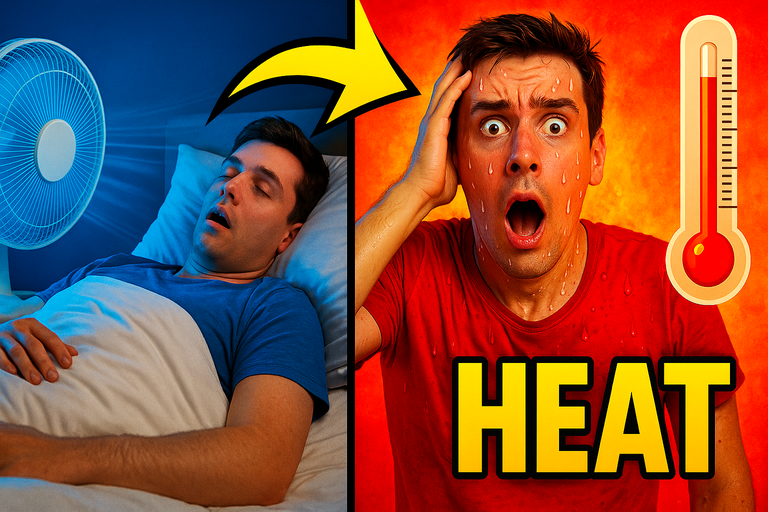Are Sweltering Nights Making Your Snoring Worse? Here’s What Climate Change Has to Do With It

Ever wake up feeling like you fought a wrestling match against your own pillow? Or maybe you keep getting nudged by your partner because you’re “snore-casting” your way through the night—even more than usual. Believe it or not, there might be a bigger culprit than just late-night snacking or allergies: climate change is sneaking its way into our bedrooms and, yes, even into our noses and throats.
I know, it sounds dramatic. But I couldn’t ignore it after reading this eye-opening article from Fortune that lays it out bluntly: “Warmer temps could contribute to worsened obstructive sleep apnea, research shows.” As someone who’s been on a lifelong quest for quieter, deeper sleep (and as someone very familiar with that awkward “was I snoring again last night?” conversation), I had to dig deeper. Here’s what I found, and why it matters to every snorer—or partner of a snorer—out there right now.
The Shocking Link: Hotter Nights, Louder Snores?
Let’s face it—summer heatwaves are hitting harder and sticking around longer. If you’ve noticed your bedroom turning into a sauna even at night, you’re not alone. According to the Fortune article, over 25 million Americans already deal with obstructive sleep apnea (OSA), and hotter temps are making these episodes worse and more frequent.
But why does heat mess with your sleep? When your room turns tropical, your body works overtime to stay cool, often making it harder to drift into that coveted deep sleep. For snorers, here’s the kicker: high humidity and heat can: - Swell your nasal and throat tissues (hello, blocked airways) - Dry out your mouth and throat (increasing vibration and snoring) - Make you restless—meaning more chances to snore loudly and wake everyone up
What’s Really Happening While You Sleep (Or Try To)
Here’s a quick refresher: sleep apnea means your airway closes or gets blocked repeatedly while you sleep—sometimes for seconds at a time. This can lead to choking sounds, gasps, and those jarring micro-awakenings that wreck your rest (and, let’s be honest, your next-day mood).
When climate change amps up the temperature, studies suggest that these blocks get more frequent. You may not notice it immediately, but you’ll likely feel groggier, crankier, and strangely hungry—all classic signs of poor-quality sleep due to OSA.
Are There Solutions—Or Are We Doomed to Snore Forever?
Deep breath (through your nose if you can!): there are ways to fight back against climate-fueled snoring. Here’s what actually works, even as the thermometer climbs:
1. Cool Your Room Strategically: - Invest in blackout curtains and a good fan. - Consider a cooling mattress pad. - Ditch heavy bedding, opt for breathable cotton sheets.
2. Stay Hydrated, But Not Right Before Bed: - Sipping water throughout the day keeps your nasal passages happy. - Avoid loading up on liquids right before bedtime (nobody likes late-night bathroom runs).
3. Reassess Your Anti-Snoring Tools: - Not all solutions are equal, especially in today’s warming world. - Mouthpieces and oral appliances are gaining traction because they address the actual cause—airway blockage.
My Personal Experience: From Skeptic to Sleeper
I’ll admit it: I was skeptical of mouthpieces. They looked intimidating and sounded uncomfortable. But after yet another “elbow in the ribs” wake-up, I decided it was time to try something new.
That’s when I discovered the Snorple Anti-Snoring Mouthpiece. What stood out? The customization was simple (boil-and-bite right in the microwave—no fiddly pots!), and the materials felt safe and hypoallergenic. I appreciated that you can adjust the jaw advancement for a just-right fit. Was it love at first sleep? Honestly, the first night was…weird. But after a few tweaks, I genuinely slept quieter and woke up with way more energy.
What I liked most, though, is that it’s not just a “one size fits all” device. According to Snorple’s official site, you get features of both mandibular advancement devices (MADs) and tongue stabilizing devices (TSDs). In essence, it’s tackling the problem from two angles—perfect when the heat and humidity are working against you. Plus, there’s a 30-day money-back guarantee, which made it feel like a low-risk experiment.
The Takeaway: Control What You Can, Sleep Better Tonight
Here’s the hard truth: we can’t singlehandedly cool the planet overnight. But we can take steps to keep our bedrooms (and airways) as open and healthy as possible. If you’re snoring more and sleeping less this summer, don’t chalk it up to getting older or “just being a snorer.” Climate change is a real, sneaky factor—and it means the tools we use to fight back matter more than ever.
- Monitor your room’s temperature
- Stay hydrated
- Reevaluate your snoring solutions—especially oral devices designed for comfort and customization
If you’re curious whether an adaptable mouthpiece could make a difference, check out these customizable anti-snoring mouthpiece options and see if one fits your needs (and mouth!). You might just rediscover what a truly restful night feels like—even as the world heats up.
Are you noticing more snoring (from yourself or someone else) as the temperatures rise? What tricks have helped you reclaim your restful nights? Share your experience in the comments below—let’s help each other sleep better, no matter what the thermostat says!